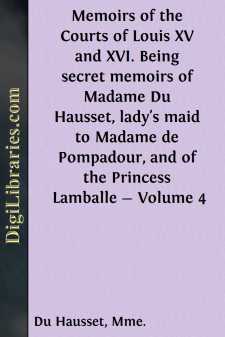History
- Africa 30
- Americas (North Central South West Indies) 50
- Ancient 68
- Asia 58
- Australia & New Zealand 8
- Canada 41
- Caribbean & West Indies 1
- Civilization 20
- Eastern Europe 12
- Europe 310
- Expeditions & Discoveries 60
- General 77
- Historical Geography 1
- Jewish 9
- Latin America 3
- Medieval 8
- Middle East 13
- Military 248
- Revolutionary 8
- Study & Teaching 5
- United States 353
- Western Europe
- World 13
Western Europe Books
Sort by:
by:
Dutton Cook
CHAPTER I. The man who, having witnessed and enjoyed the earliest performance of Thespis and his company, followed the travelling theatre of that primeval actor and manager, and attended a second and a third histrionic exhibition, has good claim to be accounted the first playgoer. For recurrence is involved in playgoing, until something of a habit is constituted. And usually, we may note, the playgoer...
more...
by:
Mme. Du Hausset
Madame sent for me yesterday evening, at seven o'clock, to read something to her; the ladies who were intimate with her were at Paris, and M. de Gontaut ill. "The King," said she, "will stay late at the Council this evening; they are occupied with the affairs of the Parliament again." She bade me leave off reading, and I was going to quit the room, but she called out,...
more...
The "Salient." First Phase. The end of March, 1915, found the 50th (Northumbrian) Division of the Territorial Force awaiting orders to proceed overseas. The infantry of the Division consisted of the 149th Infantry Brigade (4th, 5th, 6th and 7th Battalions Northumberland Fusiliers), the 150th Infantry Brigade (4th Battalion East Yorkshire Regiment, 4th and 5th Battalions Yorkshire Regiment, and...
more...
by:
Mme. Du Hausset
"The accession of Louis XVI. and Marie Antoinette to the crown of France took place (May 10, 1774) under the most propitious auspices! "After the long, corrupt reign of an old debauched Prince, whose vices were degrading to himself and to a nation groaning under the lash of prostitution and caprice, the most cheering changes were expected from the known exemplariness of his successor and the...
more...
by:
S. J. Wilson
CHAPTER I. Holding up the Turk. In September, 1914, the 7th Bn. Manchester Regiment set out for active service in the East in goodly company, for they were a part of the 42nd (East Lancashire) Division, the first territorials to leave these shores during the Great War. After many interesting days spent on garrison duty in the Sudan and Lower Egypt they journeyed to Gallipoli soon after the landing had...
more...
CHAPTER I INTRODUCTION This book is intended not to raise fears but to record facts. We wish to describe with pen and pencil those features of England which are gradually disappearing, and to preserve the memory of them. It may be said that we have begun our quest too late; that so much has already vanished that it is hardly worth while to record what is left. Although much has gone, there is still,...
more...







